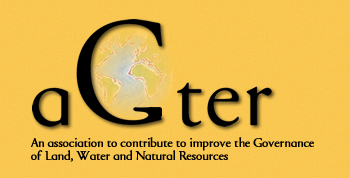
|
This paper develops the themes discussed at a high-level meeting organised by the
How does the customary management of the forest by an indigenous community in Indonesia, in land tenure conflict with successive stakeholders since the Dutch colony, ensure the sustainability of the agrarian system? A 3 minutes video.
The approach presented in this FAO document does constitute a further development of the previous ones, the Participatory and Negotiated Territorial Development (PNTD) and the Improving Gender Equality in Territorial Issues (IGETI). Greening the Negotiated Territorial Development approach (GreeNTD) highlights the increased relevance that the search for an equilibrium between the social, economic and ecological sphere has in our daily life.
This document proposes concrete responses to the following challenges: improving trust between social actors, strengthening social cohesion and promoting systemic territorial development. Paolo Groppo has been coordinating FAO work on this issue during many years. He is a member of AGTER.
An interesting summary note written from the workshop organized jointly by CIRAD, GRET and Friends of the Earth, on 17 and 18 June 2013 in Nogent sur Marne.
After traditionally being conspicuous by its absence from public policy, the soil has been drawing increasing interest in recent months. The FAO (Food and Agriculture Organization) decided to proclaim 2015 International Year of the Soils, and soil has taken up center stage in an initiative launched by France, around two highly topical themes: agriculture and the climate. Agriculture is one of the main sectors responsible for climate change but is also strongly affected by its impacts. With (...)
This article gives an idea of the main transformations that took place in the last decades, concerning the access rights, the management of the resources and the running of the fishing.
At the end of Second World War, the fishing sector showed a considerable growth. The industrial fish catches were intensifying as fishing techniques have been developed: big trawlers, sonar fish finders, more and more sophisticated fishing equipment. Worldwide fish catches has shown a regular growth since (...)
Forests management has become a central issue of the United Nations negotiations on reducing emissions of greenhouse gases to fight against global warming.
The Kyoto protocol encourages the developed countries, that committed themselves to reduce their emissions of greenhouse gases, to preserve or to increase their forests. On the other hand, these countries (and the associated national industries) can achieve, in the Southern countries, plantations of trees in order to get some carbon (...)

|

|
Since several years, due to the gradual depletion of fish stocks and environmental deterioration, the fishing sector is facing the most serious crisis it has ever known. Commercial productivity of oceans has reached its lowest level and 75% of the world’s most important fishing areas are overexploited. In all parts of the world, ocean ecosystems and coastal populations suffer the consequences of unsustainable fishing.
Depletion of fishing resources may increase due to private appropriation (...)
|










